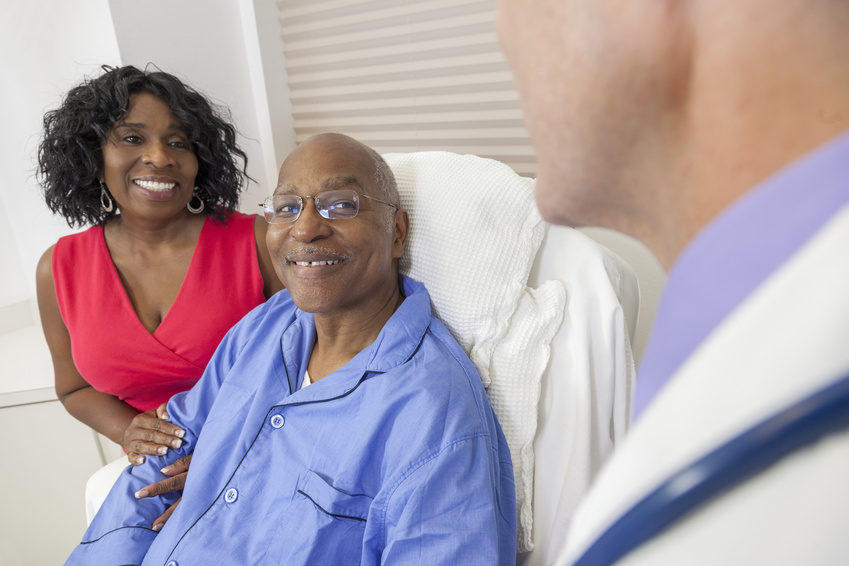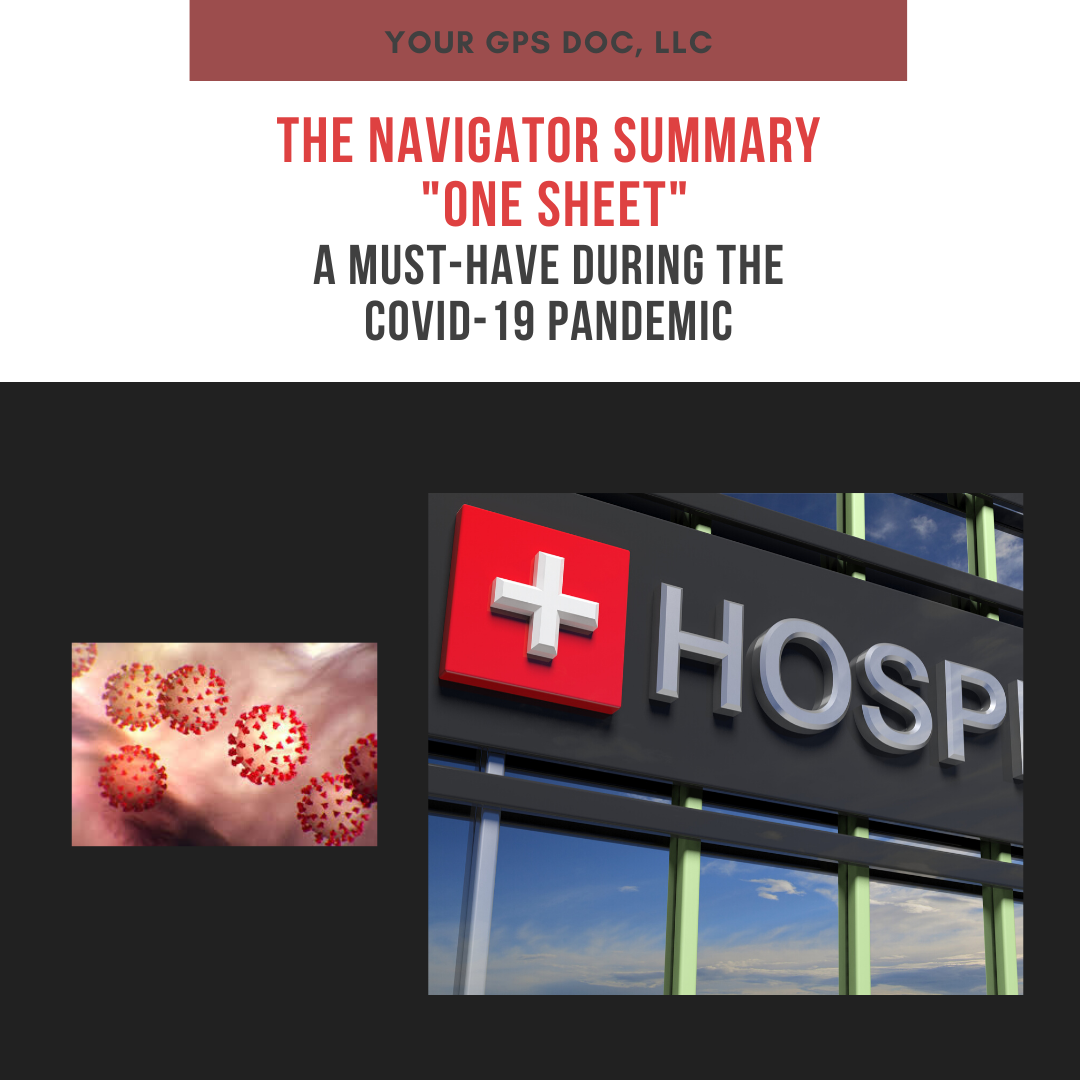My dad was hospitalized several times while my sisters and I helped to care for him. They were usually brief hospital stays of 2-3 days. No matter how long he stayed or where he was hospitalized, there was always one common element—miscommunication. Inevitably, there would be a mix-up regarding his medications or misinformation about his past medical history. My sisters and I learned early in our caregiving journey that our physical presence during encounters with the healthcare system was a key component of our dad’s safety.
As I’ve shared with you before here on this blog and on my weekly Facebook Live show, Navigator NuggetsTM, medical errors are believed to be the 3rd leading cause of death. The majority of these errors occur in hospital settings. When individuals are sick enough to be in the hospital, they are extremely vulnerable to errors. The reasons for this are multifactorial. Not only are they more likely to be exposed to high-risk medications and procedures, but they also may not be able to effectively advocate for themselves. Being a strong advocate in medical settings requires significant involvement, concentration and attention. It can be difficult to advocate for yourself while simultaneously trying to rest and get well.
This is where family caregivers can be incredibly helpful. When a family member is hospitalized, it is imperative that someone steps in as their advocate. This can be a spouse, relative, or even a friend, but someone needs to assume this role, if at all possible.
There are many things you can do to make your loved one feel more comfortable in the hospital. Making sure they have their favorite blanket, pajamas, and/or slippers is a start. Sitting and talking with them can help relieve some of their anxiety so they can focus on getting better.
These things are important, but your role as a family caregiver does not end here.

Because most friends and family members do not have a medical background, I find that they underestimate their ability to positively impact the medical care their loved one receives in the hospital. Knowledge is power and one of the best ways to gain knowledge is to ask questions. Asking questions provides you with useful information that will help you serve as an effective advocate for your loved one. But there’s something else you gain by asking questions. When you ask questions during healthcare encounters, you put the medical team on alert. It informs them that you are an active participant in your loved one’s medical care. Studies show that when patients (and their family members) are involved in their medical care, they experience improved outcomes.
Many of my clients tell me they don’t like asking the doctors or other members of the medical team questions because “they’re so busy”. Yes, it’s true that there is limited time to engage in conversations with healthcare professionals, especially in the hospital setting. However, if you focus on a few important questions every time your loved one is hospitalized, you can ensure they are receiving appropriate care while maximizing the limited time available.
1. What is the diagnosis?
By the time your family member is admitted to the hospital (whether they are being kept in the Emergency Department or in a special unit for observation or admitted as an inpatient to a hospital room), they should have a working diagnosis. This is the doctor’s impression of their main problem, based on the information they provided, their physical examination, and all of the diagnostic tests (laboratory studies, X-rays, etc.) that were performed.
Knowing the diagnosis is very important, as it will guide all of the future decisions of the medical team. Be sure to ask the doctor to give you the diagnosis in medical terms and to also provide an explanation in laymen’s terms so that you can clearly understand what is going on with your loved one.
2. What is the treatment for this condition?
Once you understand the diagnosis, the next step is to ask questions about how this condition will be treated in the hospital. Among medical professionals, this is known as “the plan”. Ask the doctor about the medications that will be provided. Find out if there are additional tests that need to be performed. This will not only help prepare your family member for what is to come but if things are not happening as planned it is important to follow up and inquire about whether the plan has been changed or why it is not being carried out.
3. What needs to happen before your family member can go home?
Every time a patient is hospitalized, the admitting doctor should have a general idea of what he/she expects to see that will make them comfortable sending the patient home. Known as “discharge criteria” among healthcare professionals, these are things such as, “stable vital signs”, “able to keep liquids down”, and “no longer requiring IV medications”. Some of these criteria will be general, but some will be tailored to the reason your loved one was hospitalized. From the day your family member is hospitalized, make sure you have a clear understanding of the discharge criteria. As they are met one by one, this will give you a good idea as to when discharge is approaching, and you can plan accordingly. Of course, you should also be in regular contact with the nurses, doctors and other members of the medical team regarding discharge.
4. What does your loved one need to do when he/she gets home?
Many patients find themselves right back in the hospital within days to weeks of being discharged. In some cases, these readmissions were preventable and stemmed from a lack of knowledge and understanding about the care plan after discharge. Make sure you have clear written instructions that specify the following: When should your family member be seen for a follow-up appointment and with whom? What medications need to be taken at home? Were there changes made to the medication regimen (additions, deletions, changes in dose)? Are there restrictions or special instructions related to diet and/or physical activity? Who do you call if there is a question or problem? (This is probably one of the most important questions you need to ask.)
Being a family caregiver is a daunting task but your friend or relative needs you, especially during a hospitalization. Asking these questions (and documenting the answers in a notebook or on your smartphone) is the first step in becoming a powerful advocate as you help your loved one receive safe and appropriate medical care.
I encourage you to check out my FREE step-by-step guide What to Do When Your Loved One is Hospitalized. You can either print it out or save it to your smartphone or tablet so you have all of the information you need during the next hospital stay.








Love that you have taken the time to create this service for patients. Its a sad statement on health care today that a guide like yourself is often needed to navigate this increasingly complex system. While many cancer centers have dedicated “navigators” assigned to your care, most patient interactions with the healthcare system will leave you to navigate the system on your own. These tips on how to get the system to work for you and your family are so helpful. Thank you!